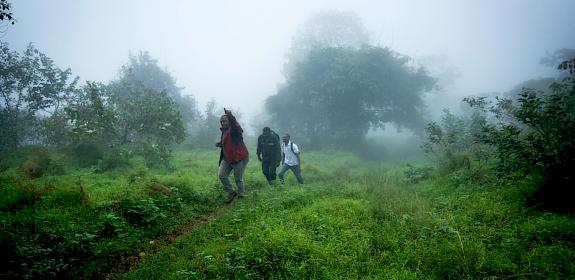Congo Basin: Partners speak of need for collaboration to safeguard forest ecosystems
Brussels, Belgium, 5th December 2018—Last week the 18th Meeting of the Partners to the Congo Basin Forest Partnership (CBFP) in Brussels concluded with the “Brussels Declaration”—re-emphasising inter alia, the importance of concerted cross‐sectoral efforts to combat organised cross-border poaching across Central Africa.
The Declaration recognises the importance of collaboration between Ministries of Environment and Forestry, Defence, and Agriculture, as well as Ministries of Justice and Law Enforcement; and that destination countries for wildlife trafficking together with international Conventions (such as the Convention on International Trade in Endangered Species of Wild Fauna and Flora (CITES)) have important roles in approaches to strengthen surveillance, deter traffickers, and support sub-regional anti‐poaching operational frameworks.
CBFP Parties also recalled that illegal logging and other illegal exploitation practices of land and natural resources also threaten the Congo Basin forests, erode the rule of law and are also catalysts for conflict. Partners also encouraged and enhanced contributions by the private sector to the sustainable management of forest and natural resources in the Congo Basin.
The CBFP is a non-binding multi-stakeholder partnership enabling member organisations to co-operate on a voluntary basis[1]. The Partnership is open to all states, international institutions and organisations, NGOs, research and academic institutions and private sector entities, which adhere to this Cooperation Framework. TRAFFIC became a CBFP member in November 2008.
TRAFFIC presented two side-events to CBFP participants—the first on 27th November at the Royal Museum for Central Africa, Brussels, on “Wildlife Trade Law Enforcement in the Congo Basin: Becoming informed actors through AFRICA- TWIX (= Trade in Wildlife Information eXchange) - a tool for law enforcement staff”. AFRICA TWIX has been a successful tool to support and enhance collaborative and transboundary efforts between government-mandated law enforcement and management staff in their daily efforts to address transnational wildlife crime.
Pol Meuleneire of the Belgian Customs Investigation unit based at Brussels airport spoke about how a similar system, EU-TWIX, had over more than 10 years of working with the now 37 countries linked in Europe successfully helped trigger interventions leading to disruption of smuggling routes for illegally traded wild species into Europe. Many examples related to smuggling from Africa. Meuleneire also stressed the complementarity of TWIX working with several international agencies such as UNODC, INTERPOL and the WCO.
In Africa, the TWIX tool has proven effective in helping to detect international wildlife trade-related organized crime, thereby supporting national efforts to safeguard Central Africa’s wild fauna and flora. Facilitated by Benjamin Smale of GIZ, side-event participants discussed how to continue their support for the TWIX tool, now established in five countries of the Congo Basin, and plans for expansion to include two more Central African countries soon.
Another TRAFFIC-led side-event on “Africa-China collaboration: Opportunities for Sustainable Natural Resource Trade between the Congo Basin and China” took place on 28th November at Palais d'Egmont, Brussels, and looked at examples and lessons learned on how to enhance the governance of timber trade along the trade chain from the Congo Basin to China. Thomas Pichet—speaking on behalf of the UK Department for International Development (DFID)—illustrated the mutual benefits for China and the UK as stemming from the DFID’s Forest Governance, Markets and Climate Programme dialogue process on timber trade with China, and its results over the past 10 years. Denis Mahonghol and Roland Melisch (both of TRAFFIC) spoke about how enhancements to transparency and governance to reduce illegal timber trade along the trade chain from Cameroon to China, and explained about the co-operation opportunities between Congo Basin countries and China arising from the recent Beijing summit of the Forum on China-Africa Cooperation (FOCAC) that concluded with its FOCAC Beijing Action Plan (2019–2021) in September 2018.
The 18th Meeting of the CBFP demonstrated how sharing Partner’s experiences about practical methods and tools that provide solutions to conservation challenges faced in the Congo Basin is as important as ever
Roland Melisch, Senior Director Africa and Europe at TRAFFIC
Notes:
[1] With the signing of the Central Africa Forests Commission (COMIFAC) Treaty and the adoption of the sub-‐Regional COMIFAC Convergence Plan in 2005 in Brazzaville, the Heads of State and Government of the Congo Basin countries confirmed their commitment to the principles of conservation of the biodiversity and the sustainable management of Central African forest ecosystems, the fundamental rights of their populations to benefit from forest resources and the imperative to reconcile development needs with conservation within the framework of international cooperation. Cooperation within CBFP aims to support this shared vision of the Central African Heads of State, notably by improving measures taken, including technical and financial support measures, to promote the conservation of biodiversity and the sustainable management of forest ecosystems, to combat climate change and to alleviate poverty in Central African countries in line with the COMIFAC Convergence Plan.
More on the CBFP’s Brussels Declaration stemming from the 18th MoP of the CBFP
- https://pfbc-cbfp.org/news_en/items/Brussels-Declaration-MOP18.html (EN) and
- https://pfbc-cbfp.org/actualites/items/D%C3%A9claration-Bruxelles.html (FR)
More information on the Congo Basin Forest Partnership (CBFP) can be found under:
Participation and side-events were supported by
- The German Partnership project, implemented by GIZ on behalf of the German Federal Ministry for Economic Cooperation and Development (BMZ) and the German Federal Ministry for Environment, Nature Conservation and Nuclear Safety (BMU).
- The Belgian Customs,
- The UK Department of International Development (DFID) (now FCDO)'s Forest Governance Market and Climate (FGMC) Programme for its support towards TRAFFIC’s work on Cameroon to China timber trade.
TRAFFIC is grateful for the support provided to the TWIX tool in Europe and Africa by a number of government agencies.





